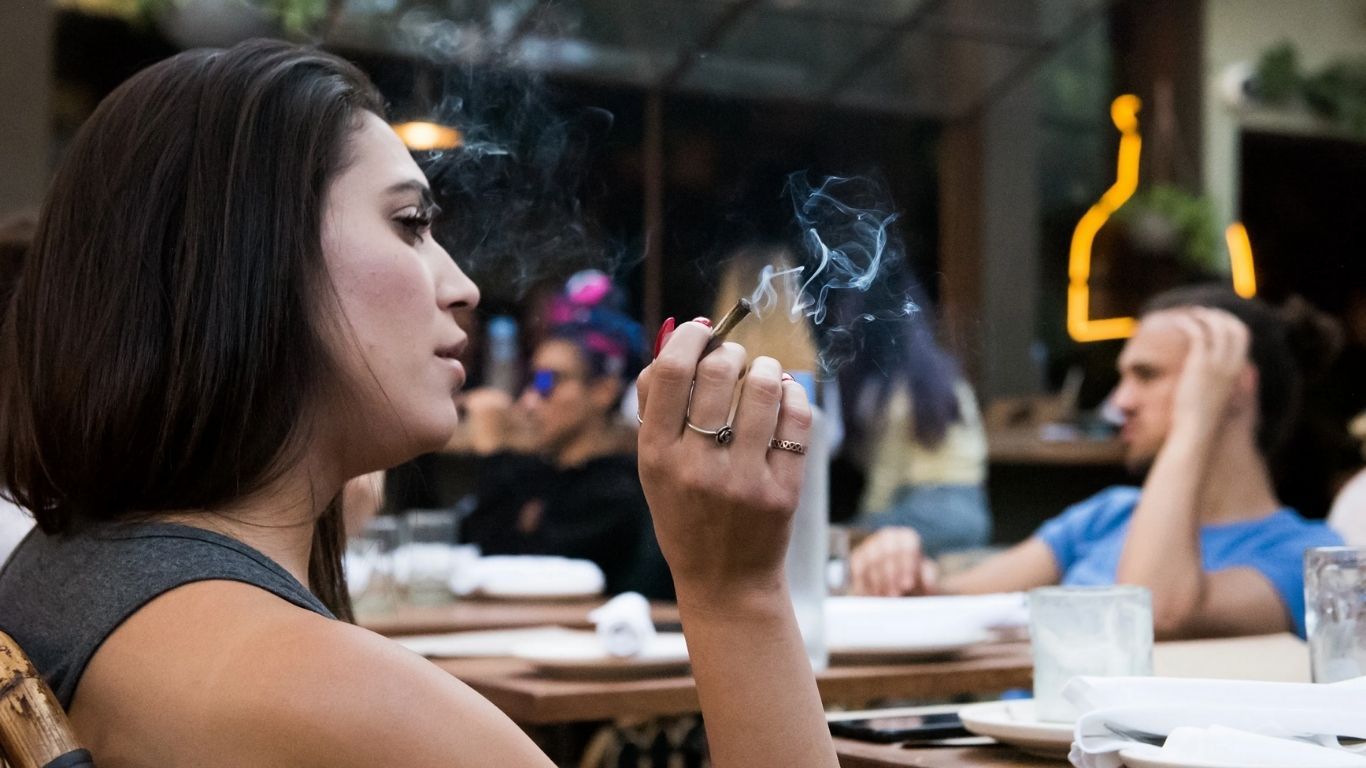
The BC Government plans on making several changes to provincial cannabis rules, which it says will assist the cannabis industry and cannabis tourism in BC.
As part of a broader industry outreach initiative, BC’s Liquor and Cannabis Regulation Branch (LCRB) is seeking input from the cannabis industry and related stakeholders regarding plans to eliminate provincial constraints on promoting locations for cannabis consumption and to allowing cannabis consumption on patios, with the latter limited to areas where smoking and vaping are already permitted under provincial regulations.
Currently, BC does not allow anyone to smoke or vape cannabis on a patio, even in places where they can smoke tobacco or vape non-cannabis products. Provincial law also does not allow anyone to promote a place at which to consume cannabis. Municipalities and local First Nations may also have their own restrictions in place that would not be affected by any provincial rule changes.
The proposed changes would not allow for in-store consumption, but are a step towards creating allowances that will allow for the formal marketing of spaces and events that can more directly cater to consumption.
BC has announced that this feedback exercise, available to stakeholders until August 11, is a crucial step in the gradual development of cannabis hospitality and tourism “experiences” in the province.
BC has been increasingly focussing on the issue of consumption spaces and cannabis tourism, launching a province-wide engagement paper last year. The What We Heard report from that engagement process was then released in January 2023. The report showed significant public support for consumption spaces, balanced with concerns from law enforcement and public health agencies.
Industry response is mixed
According to Jaclynn Pehota, the executive director of the Retail Cannabis Council of BC (RCCBC), the organization’s members are supportive of the proposed changes regarding cannabis consumption locations in BC. However, Pehota highlights that the members are primarily focused on several other industry concerns.
“RCCBC’s member retailers are pleased to see the LCRB opening consultation on restrictions around consuming cannabis in outdoor spaces. RCCBC’s members are broadly supportive of leaving decisions specifically related to the appropriateness of cannabis consumption on patios to local governments. It seems reasonable that citizens and their representatives are best equipped to decide how to integrate outdoor cannabis consumption in their communities.”
“Membership welcomes the LCRB regularly revisiting BC’s regulatory framework for cannabis. Regular policy review ensures BC’s framework remains in step with the reality of today’s sector,” she added.
“Encouraging the government to undertake a review of the wholesale fee structure has been a focus of our advocacy since the launch of the Direct Delivery program in August 2022.
Jaclynn Pehota, Retail Cannabis Council of BC
In regard to raising the eight-store cap for cannabis retailers, Pehota says the RCCBC is cautiously supportive as long as the government takes a careful approach that can “safeguard the diverse community of small businesses that has been fostered in BC’s cannabis sector” and avoid the kind of downward price pressure seen in provinces that have a greater number of large discount chain stores.
Still, Pehota says the priority for RCCBC’s members is reducing the LDB’s 15 percent wholesale markup, especially for sales made through the direct delivery program that allows small-scale BC producers to ship products directly to retailers. The LDB charges this “proprietary fee” on products that go through its centralized distribution centre in the Lower Mainland, as well as on products that producers sell directly to retailers, without ever making their way through the central warehouse.
Instead, RCCBC’s recommendation is a reduction to 2.5 percent or lower, which Pehota says would be more comparable to the markup for craft beer
Jeff Curtis, the owner of Boro and Beyond in BC, which offers among its services, dab bars for cannabis pop-up events in the province, says the proposed changes to allow the promotion of locations for cannabis consumption and to allow cannabis consumption on patios, while modest, are a big first step towards what he sees as a more compressive approach to consumption spaces.
“Besides being able to mitigate public nuisance impacts, consumption spaces represent a place where government can concentrate marketing efforts to educate about overconsumption and where trained professionals can give first experiences and education to reduce adverse reactions.
“Aside from these, having licensable, insurable establishments and destinations to promote 19+ events would be huge. We’ve seen how big events and festivals bring in local revenue and generate jobs, and opening up cannabis would be no different.”
15 Percent Direct Delivery fee an industry priority
While many producers and retailers say they are very happy with the direction of the Direct Delivery program, the fact producers still have to pay this fee while also taking on the extra work of distribution has made it less than ideal for others.
“Our member retailers and our associate member producers have delivered the message loud and clear that reducing the 15 percent markup, especially in the context of Direct Delivery, is an advocacy priority,” Pehota told StratCann. “Encouraging the government to undertake a review of the wholesale fee structure has been a focus of our advocacy since the launch of the Direct Delivery program in August 2022.
“A lower whole markup can’t come soon enough for both retailers and producers,” she adds.
The retail organization instead recommends fees comparable to what the LDB charges for craft beer producers to sell directly to retailers. In a memo the organization sent out to members earlier this month, Pehota said they hope to see changes to the fee structure sometime in 2024.
“RCCBC continues to deliver the message that strong sectoral supports, like a reduction in wholesale fees, are desperately needed in BC as licence holders continue to fight to win market share from unregulated operators.”
The priority is saving BC craft cannabis. And in order to do so, this government has to make a substantial reduction or elimination of the wholesale markup on direct delivery.
Ehren Richards, Sunrise Cannabis
BC’s Ministry of Public Safety and Solicitor General, which oversees the cannabis file in the province, says it’s committed to reviewing the direct delivery program and is expected to “include consideration of the 15 percent markup that is applied to products registered for the direct delivery program and the program’s eligibility criteria.”
Some Vancouver retailers StratCann spoke with were somewhat more candid about their concerns over BCs focus on lifting the store cap rather than addressing the direct delivery fees.
Ehren Richardson, the co-owner of Sunrise Cannabis on Kingsway in Vancouver, says he doesn’t see the changes in consumption as particularly significant, and doesn’t understand the call to lift the eight-store cap. Instead, he says the removal of the 15 percent fee that producers must pay to sell into the direct delivery program would benefit retailers like him because it would allow them to carry a greater variety of local products at more competitive prices.
“I think that issue [the eight-store cap] is probably among the lowest priority issues facing the cannabis industry right now,” says Richardson. “The priority is saving BC craft cannabis. And in order to do so, this government has to make a substantial reduction or elimination of the wholesale markup on direct delivery. That’s the only thing that’s going to save us, not lifting the eight-store cap.”.
“There seems to be a disconnect between what the industry needs and what the BC government is doing”
Feven Berhane, KushKlub Canada
Grant Pan, General Manager at La Canapa, with three locations in Vancouver, shares a similar sentiment. While the BC government says it wants to support BC’s small craft growers, Pan is skeptical.
“It seems all their policy changes just benefit the big players. We’re a small store with three locations, and we don’t need the cap lifted. I think that’s just the big chains. That doesn’t help the BC craft industry. I don’t think the government really wants to help the little guys.”
However, Jeff Guignard, Executive Director at Alliance of Beverage Licensees (ABLE BC), which recently launched its own cannabis division to represent industry concerns, says he understands the concerns some retailers have but sees the change, if it happens, being modest in comparison to other provinces.
“I don’t think anybody wants to see a massive, single monopoly chain controlling the retail industry,” Guignard tells StratCann,“ but there are economies of scale that come from scaling up. I’m not suggesting we necessarily remove the cap. I don’t think industry so far says they support that. But there’s definitely some interest in increasing it, doubling it or increasing it to twelve, something like that.”
Feven Berhane, the co-founder of retail store KushKlub Canada, with a handful of locations in BC, Manitoba, and Ontario, says she is also unsure of why BC is prioritizing raising the store cap rather than prioritizing changing the 15 percent fee.
“There seems to be a disconnect between what the industry needs and what the BC government is doing,” says Bernhane. “If they help the micros they help everybody. But I don’t think the BC government understands that. That is what will help independent retailers. Even lowering that fee by a few points would make a big difference.”











